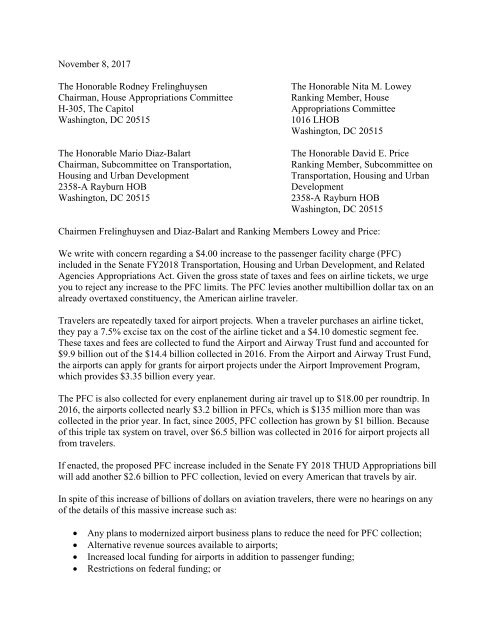GBTA TU PFC LTR 11-8-2017
Create successful ePaper yourself
Turn your PDF publications into a flip-book with our unique Google optimized e-Paper software.
November 8, <strong>2017</strong><br />
The Honorable Rodney Frelinghuysen<br />
Chairman, House Appropriations Committee<br />
H-305, The Capitol<br />
Washington, DC 20515<br />
The Honorable Nita M. Lowey<br />
Ranking Member, House<br />
Appropriations Committee<br />
1016 LHOB<br />
Washington, DC 20515<br />
The Honorable Mario Diaz-Balart<br />
The Honorable David E. Price<br />
Chairman, Subcommittee on Transportation,<br />
Ranking Member, Subcommittee on<br />
Housing and Urban Development<br />
Transportation, Housing and Urban<br />
2358-A Rayburn HOB Development<br />
Washington, DC 20515<br />
2358-A Rayburn HOB<br />
Washington, DC 20515<br />
Chairmen Frelinghuysen and Diaz-Balart and Ranking Members Lowey and Price:<br />
We write with concern regarding a $4.00 increase to the passenger facility charge (<strong>PFC</strong>)<br />
included in the Senate FY2018 Transportation, Housing and Urban Development, and Related<br />
Agencies Appropriations Act. Given the gross state of taxes and fees on airline tickets, we urge<br />
you to reject any increase to the <strong>PFC</strong> limits. The <strong>PFC</strong> levies another multibillion dollar tax on an<br />
already overtaxed constituency, the American airline traveler.<br />
Travelers are repeatedly taxed for airport projects. When a traveler purchases an airline ticket,<br />
they pay a 7.5% excise tax on the cost of the airline ticket and a $4.10 domestic segment fee.<br />
These taxes and fees are collected to fund the Airport and Airway Trust fund and accounted for<br />
$9.9 billion out of the $14.4 billion collected in 2016. From the Airport and Airway Trust Fund,<br />
the airports can apply for grants for airport projects under the Airport Improvement Program,<br />
which provides $3.35 billion every year.<br />
The <strong>PFC</strong> is also collected for every enplanement during air travel up to $18.00 per roundtrip. In<br />
2016, the airports collected nearly $3.2 billion in <strong>PFC</strong>s, which is $135 million more than was<br />
collected in the prior year. In fact, since 2005, <strong>PFC</strong> collection has grown by $1 billion. Because<br />
of this triple tax system on travel, over $6.5 billion was collected in 2016 for airport projects all<br />
from travelers.<br />
If enacted, the proposed <strong>PFC</strong> increase included in the Senate FY 2018 THUD Appropriations bill<br />
will add another $2.6 billion to <strong>PFC</strong> collection, levied on every American that travels by air.<br />
In spite of this increase of billions of dollars on aviation travelers, there were no hearings on any<br />
of the details of this massive increase such as:<br />
<br />
<br />
<br />
<br />
Any plans to modernized airport business plans to reduce the need for <strong>PFC</strong> collection;<br />
Alternative revenue sources available to airports;<br />
Increased local funding for airports in addition to passenger funding;<br />
Restrictions on federal funding; or
An explanation regarding how the $4.00 tax increase was calculated and why.<br />
In addition, there has been no examination of the benefits of local funding of airports. The region<br />
that benefits from the economic engine created by a thriving airport should be responsible for<br />
significant funding. Today, passengers pay almost the entire cost of airport construction and<br />
operation. That is unfair.<br />
For these reasons, we urge you to reject any <strong>PFC</strong> increase. Thank you for your consideration.<br />
Sincerely,<br />
Michael W. McCormick, Executive Director & COO<br />
Global Business Travel Association<br />
Charlie Leocha, Chairman &Co-Founder<br />
Travelers United



